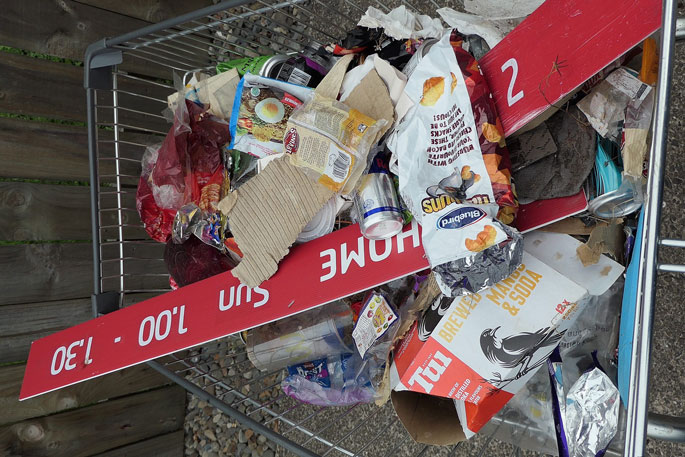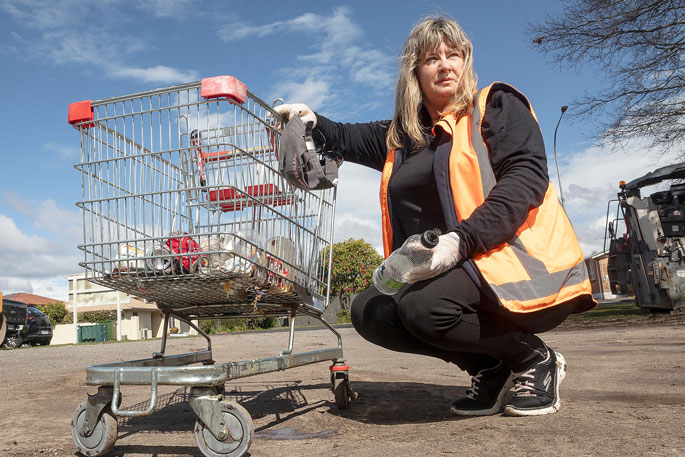A Rotorua resident who once took a weedeater to overgrown council grass is now tackling the city’s “massive” litter problem, filling seven abandoned trolleys with rubbish collected over seven months.
But Tracey McLeod says she believes the litter in the city has worsened in that time, in spite of her efforts — and the more than $6.3 million a year the local council spends on rubbish and recycling services.
“It started to get quite gross,” McLeod said of the rubbish she saw on the city’s streets.
She said a recent pick-up included used condoms and sanitary pads, which she believed had been thrown from car windows.
“Obviously these people have got no shame.”
Other items included nitrous oxide canisters, empty drink cans and food wrappers.
The member of the Restore Rotorua and Rotorua District Residents and Ratepayers groups believed there was enough cleaning happening in the city centre, but that it was a different story on neighbouring and busy roads such as Pererika St.
After she cleaned there at the end of August, she wheeled the trolley of trash to the Rotorua Lakes Council building for it to be emptied and sent the council a request for service to pick up a bag that had not fit in the trolley.
The bag had not been collected as of Friday.
McLeod believed schoolchildren were part of the litter problem.
“I don’t know whether it’s a new generation, whether they’ve got a lack of respect for their environment, whether they’re not having the environment studies.”
Rotorua Boys’ High School backed on to Pererika St and McLeod said she had spoken to principal Chris Grinter about the litter issue.
Grinter told Local Democracy Reporting he did not believe there was a litter problem at the school.
“The school lunches we provide our students have certainly helped reduce waste which has been great.”
McLeod said she also wondered if there were not enough public bins around or whether they were just not visible enough.
She suggested a bin design competition for school children would “foster pride in the appearance of Rotorua”, or sports teams could be sponsored to pick up litter as a fundraiser.
Some of Rotorua’s “Kermit-frog green” bins were missing lids or cracked and she believed they were past their use-by date.
McLeod said one on Pererika St was “always” overflowing. She knew the litter was being cleaned up in the city centre but wondered if the service needed extending to surrounding streets, including near schools.
“I think it needs to be a community joint venture, whether it’s between the council, the schools, the residents.
“I think it to be a combined effort because I think the problems got quite massive and I mean, presentation’s quite important with it being a tourist town.”
 Some of the litter Tracey McLeod collected in abandoned shopping trolleys. Photo / Supplied.
Some of the litter Tracey McLeod collected in abandoned shopping trolleys. Photo / Supplied.
Rotorua Lakes Council infrastructure and environmental solutions group manager Stavros Michael said it encouraged everyone to dispose of waste responsibly.
“Illegal dumping impacts the environment, as well as increasing [the] council and the general community costs.”
Its approach focused on education and working with schools and community groups to support initiatives.
“An example is the community of Lake Rotomā, they regularly organise volunteers to clean up in and around the lake.
“Council supports these groups with bags, gloves and disposal of the rubbish. These groups are shining examples of kaitiakitanga (guardianship).”
Michael said illegal dumping and littering was a community problem and not specific to one area. The city had “hundreds” of public bins and every household was supplied one for weekly collection so there was “no excuse”.
“People have to take personal responsibility for doing the right thing in disposing of the waste they generate.”
He said the council had not seen any increase or decrease of littering in Rotorua.
It had received 107 litter-related requests in the last six months and most related to bins that needed emptying.
Litter enforcement in the district was covered by both the Litter Act 1979 and the Solid Waste Bylaw 2016.
The council could hand out $400 fines for litter offences or, in serious cases, prosecute offenders. Individuals could face paying $5000 or $20,000 for body corporates.
One fine was issued in the first half of this year and three last year, Michael said.
There were 150 litter bins in the CBD and 656 in the city.
Waste collection contractor Smart Environmental emptied the bins and cleared litter around some suburban shopping centres.
Rotorua Central, supermarkets and other “big-box retailers” took care of litter around their stores Michael said.
Cleaning up litter in the CBD, parks and reserves was handled by Infracore.
“Litter on our suburban berms and streets is either tidied up by neighbourhood locals or when the road sweeper goes through under the roading contract.”
In response to McLeod’s comment about the overflowing Pererika St bin and the rubbish bag not being picked up, Michael said: “We’ve checked and found there was an issue with how these requests were processed. Both have now been resolved.”
A year’s clean-up costs
- Servicing litter bins and responding to illegal dumping: $891,813.87
- Kerbside all services rubbish and recycling: $5,099,838.31
- Drop site (collection points) servicing: $334,264.09
- This excludes Infracore’s CBD cleaning services and the regular road sweeping. Contract costs were up 6.7 per cent on last year.
Source: Rotorua Lakes Council
Public Interest Journalism funded through NZ On Air.




0 comments
Leave a Comment
You must be logged in to make a comment.